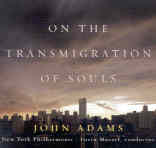John Adams’ 25-minute On the Transmigration of Souls was commissioned by the New York Philharmonic to mark the first anniversary of September 11, 2001. While Adams himself has expressed mixed feelings about taking on the commission, the results warrant no such hesitation, either as a piece of modern orchestral music or as a broader cultural object. Of course, listening to a piece like this has to be one of the most truly subjective musical experiences imaginable, since every listener will have his or her own vivid and painful memories of the attacks. As such, your reaction to Adams’ work will be inextricably intertwined with your own recollections of that day. As a New Yorker, I had a visceral reaction to the sirens that open the piece, and to the recitation by victims’ loved ones of snippets culled from the thousands upon thousands of “missing” posters that went up all over the city within days of the attacks. During that period the simple act of strolling down the street became a walking meditation of grief, sorrow, and anger, and a reflection on the lives and physical minutiae of strangers, which Adams draws upon for such lines as “a little mole on his left cheek.” (The booklet’s inside photos of the destruction of the World Trade Towers–the ashes and cinders and filthy smoke and twisted, humpbacked skeletons of steel–are also like a punch in the gut, and a galaxy away from the rapturous, evocative portrait of the towers on the disc’s overwrap.)
For this work, Adams draws upon Charles Ives for inspiration. It’s a canny decision; borrowing Ives’ ideas of layered, seemingly incongruent sounds makes perfect sense in sketching both the physical chaos of that day and the surges of raging emotion that followed. Taped and choral voices–from the “missing” posters, from a phone call made on American Airlines Flight 11, from the New York Times’ “Portraits of Grief” series–build and recede. The orchestra shudders in and out of Adams’ frame. And out of the tempest, an actual Ives quote comes into sharp focus: the sole trumpet from The Unanswered Question.
Nonesuch’s live recording of the New York Philharmonic alongside the New York Choral Artists, directed by Joseph Flummerfelt, and the Brooklyn Youth Chorus, conducted by Diane Berkin, captures all the musicians’ formidable energy, with careful balance between the prerecorded samples and the live material. The players’ sense of occasion and playing for history comes through clearly as well.
The piece stands alone on this world-premiere recording, and while some listeners might complain that it is not enough music to justify its (midprice) cost, it strikes me that no pairing would work, either with another Adams composition, which would run the risk of banality, or with another similarly-themed piece by someone else, against which the Adams inevitably would be measured. On its own, however, On the Transmigration of Souls speaks strongly to a singular experience.
































